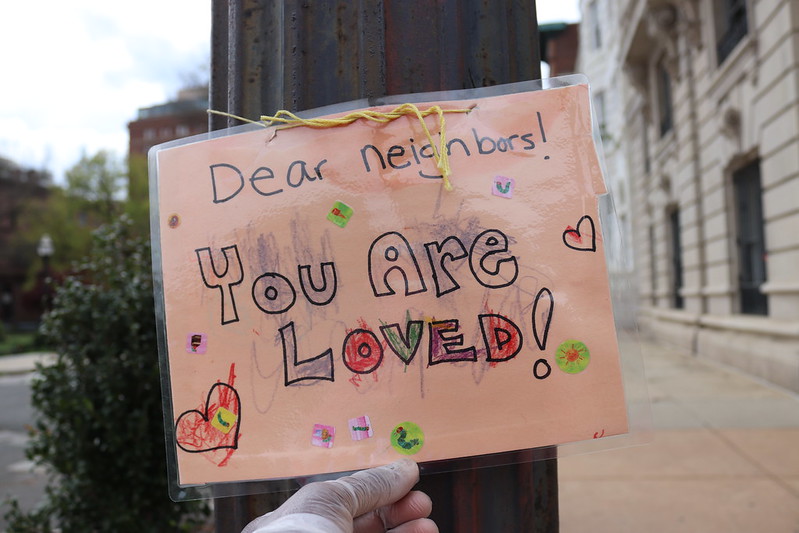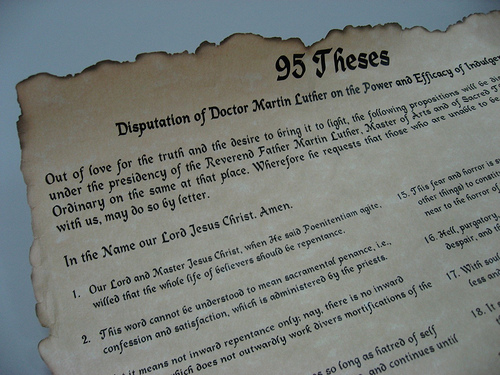Revised Common Lectionary Reflection, Twentieth Sunday after Pentecost, Year A

October 25, 2020
Lessons: Jeremiah 31:31-34; Psalm 46; Romans 3:19-28; John 8:31-36; Matthew 22:34-46
Theme: God’s faithful and generous people understand that the church is constantly reforming to be an effective witness to the gospel; however, without love all the reformation in the world won’t matter.
Key Scripture: “If you continue in my word, you are truly my disciples; and you will know the truth, and the truth will make you free.” – John 8:31b-32
“On these two commandments hang all the law and prophets.” – Matthew 22:40
If you are celebrating Reformation Sunday this week, it’s likely to be a different kind of liturgy. Whether you are in your worship space, still meeting outside, gathering digitally, or some combination thereof, the commemoration simply won’t be the same as folks may remember from past years. This is not necessarily a bad thing. Just think of the amount of change some of the folks in your parish may have already faced over the past several months. Consider your own swift and immediate reaction to the need to change so much about the way you do ministry. COVID-19 has brought us to the crossroads of change and hope. The pandemic has shown us the worst of human behavior and the best of it. Acts of heroism, bravery, and kindness—both great and small—make for powerful sharing and storytelling. And yes, God is in the midst of every single bit of it, the pain and suffering, the joy and hope, the love and care.

In past years, Reformation Day may have felt like a sort of Lutheran-ethnic celebration/pep-rally that has occasionally strayed into anti-Catholic rhetoric and sentiment. In the United States, like so many of our expressions of religiosity, Reformation Day has included a decidedly personal emphasis: I am saved by grace through faith. If I continue in Jesus’ word, I am a true disciple, and the truth will make me free. Of course there is a personal aspect to reformation within the church. It takes a collection of “I’s” to form the Body of Christ, but that process also transforms the “me” to a cohesive “we” where everyone’s gifts, talents, and resources can find their full expression. This organic flow and process, fueled by the passions and fires of church reformers across the ages has been responsible for some of the best reforms possible, helping the church catholic resist falling prey to its own drive to institutionalize and protect its assets and boundaries. In short, church reformation gives the Holy Spirit some wiggle room, and Lutherans can be justifiably appreciative of Martin Luther’s role in working for church reform during this time.
But let’s not stop there and resign this day to a historical celebration that no longer has any real application to us and our various contexts. Let’s ask what reforms the church stands in need of now. Do we need to address systemic racism, hunger, poverty, a pro-life birth-to-death ethic, a living wage, protections for vulnerable populations such as our LGBTQ siblings? Who is not gathered around Christ’s table with us and why not? Let’s dream of a bigger reformation, one that looks at systems and power and, for goodness’ sake, the Christ at work in the world today. Because of COVID-19 nothing is the same. So much of how we understand and live life has changed, from digital schooling to digital worship to working from home (if you’re lucky enough to still have work), to supply chain interruptions; you get the picture.
If you are not celebrating Reformation Sunday, you’ll be using the lessons from the twenty-first Sunday after Pentecost. The religious leaders are still working to trap Jesus and challenge his authority, and they ask which law is the most important one (Matthew 22:36-46). We know the answer to that question: “You shall love the Lord your God with all your heart, and with all your soul, and with all your mind” (22:37). But then Jesus adds the clincher, “And a second is like it: ‘You shall love your neighbor as yourself’” (22:39).

Why not honor both sets of lessons today, celebrating the ways that reformation has moved the church through the ages, constantly reforming within context and sharing the greatest story of love, grace, and mercy ever told? We are justified by faith, yes. The Apostle Paul knew that, and Martin Luther came to understand it and explain it in a way that helped make the gospel and the means of grace accessible to the people. The reformation needed now is to use our freedom to love as Christ compels us. This love of God and neighbor is not optional; it is the very foundation of our faith and a visible, tangible sign of Christ’s body in the world.
Many people have gotten to a point where they cannot talk civilly with one another or even listen to and consider other points of views. Where’s the love of God and neighbor in that? We need a reformation of love, dear friends, a divine deluge of love poured out for neighbor and enemy, a bridge of faith constructed across a chasm of despair and fear and anger. If we truly believe that Christ’s nature is love, then how are we doing as faithful reflectors and ambassadors for that love? I believe we can do better. I know we can. This Sunday, let love be the mighty fortress that cannot be breached, and let love be our watchword and response in the days to come.
In Worship
1517 Media, the publishing ministry of the Evangelical Lutheran Church in America, and the ELCA are making available a number of resources to incorporate the 500th anniversary of the publication of Martin Luther’s “The Freedom of a Christian.” Consider reading excerpts from this treatise or using the study guide to facilitate a forum or study. Click here for more suggestions.
With
Youth
Take both gospel lessons for this day (John 8:31-36 and Matthew 22:34-46) and
use them as a springboard for discussing what reforms youth believe the church
needs today and who is most difficult for them to love. The Jewish leaders with
whom Jesus was sparring relied on their holy birthright as children of Abraham,
forgetting all the many times they were slaves under the thumb of other
governments (including Rome in the first century). What do we fall captive to
today? What enslaves us willingly or against our will? What does Jesus really
mean with the command to love God and neighbor? Remember, Jesus tells us to
love even our enemies.
With
Children
This week’s focus verse is Leviticus 19:18: – You shall
not take vengeance or bear a grudge against any of your people, but you shall
love your neighbor as yourself; I am the LORD.
In this week’s lessons from Matthew 22 and Leviticus 19, we learn just how important it is to love our neighbors. When I was a little girl, I used to watch Mr. Roger’s Neighborhood. Fred Rogers was a Presbyterian minister who found a way to teach using television. He taught us to love our neighbors—all of them—and to expand our ideas about just who really is our neighbor. He taught us to be kind, to love, to listen, and to care. He was a wise minister and human. One of my favorite sayings of his is this one: Knowing that we can be loved exactly as we are gives us all the best opportunity for growing into the healthiest of people. Mr. Rogers took God’s command to love God and neighbor seriously. Imagine what a better place our world would be if we all took a cue from Mr. Rogers about what it means to love our neighbor. If possible, show this one minute YouTube clip.
Finish with a simple echo prayer and blessing.
Dear God (Dear God),
Thank you (Thank you) for equipping Mr. Rogers (for equipping Mr. Rogers) to be an ambassador of your love (to be an ambassador of your love). Thank you for teaching us (Thank you for teaching us) to love you and our neighbors (to love you and our neighbors). Keep us from fear (Keep us from fear). Keep us hopeful (Keep us hopeful). Make us helpful (Make us helpful). Give us peace (Give us peace). Amen (Amen).
Weekly
Stewardship Bulletin Insert
How can we be better stewards of God’s amazing love and
grace? For starters, we can take Jesus’ command to love God and neighbor
seriously. Then, we can start a reformation where we are justified by grace
through faith and freed to love. Imagine how much better our world could be!
Stewardship
at Home
Jeremy and Jessica Courtney moved to Iraq in the wake of
9/11. Take some time this week to watch and/or read about their incredible
journey to love their neighbors there. It’s a very real, gritty story, full of
challenges and hope and, yes, love.
Click here to visit their website and purchase the book Love Anyway: An Invitation Beyond a World that’s Scary as Hell.
Consider gathering a digital or socially-distanced in person group to discuss the book or watch the movie and discuss it. You won’t be disappointed.
2017 Reflection: https://www.stewardshipoflife.org/2017/10/reformation-500-mash-up/
2014 Reflection: https://www.stewardshipoflife.org/2014/10/the-days-are-surely-coming/
2011 Reflection: https://www.stewardshipoflife.org/2011/10/the-truth-about-freedom/
Note: Reprint rights granted to congregations and other church organizations for local, nonprofit use. Just include this note: “Copyright (c) 2020, Rev. Sharron Blezard. Used by Permission.” Other uses, please inquire: thewritelife@hotmail.com.



I remember the insightful and creative sermon you preached a few years ago at a Reformation service at Trinity Lutheran, Hixson, TN. Your comments for this Reformation Sunday are appropriate for our time in a country and world which need much more love.
Thank you, Gary. Yes, we need a heap of love right now. Blessings to you!